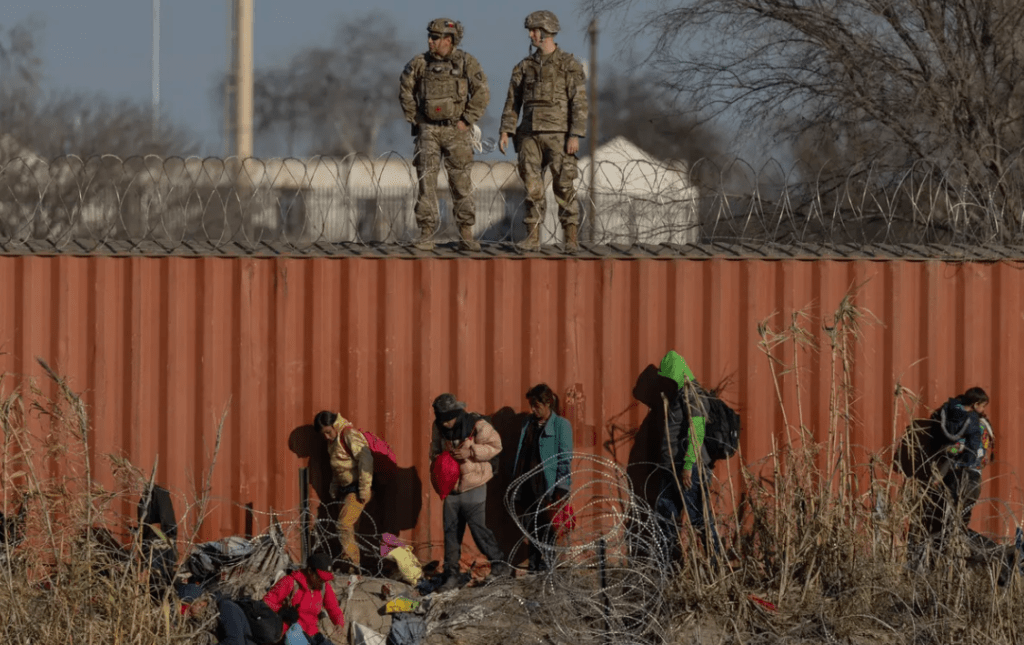
A federal judge in Austin on Thursday halted a new state law that would allow Texas police to arrest people suspected of crossing the Texas-Mexico border illegally.
The law, Senate Bill 4, was scheduled to take effect Tuesday. U.S. District Judge David Ezra issued a preliminary injunction that will keep it from being enforced while a court battle continues playing out. Texas is being sued by the federal government and several immigration advocacy organizations.
Ezra said in his order Thursday that the federal government “will suffer grave irreparable harm” if the law took effect because it could inspire other states to pass their own immigration laws, creating an inconsistent patchwork of rules about immigration, which has historically been upheld as being solely within the jurisdiction of the federal government.
“SB 4 threatens the fundamental notion that the United States must regulate immigration with one voice,” Ezra wrote.
Gov. Greg Abbott signed SB 4 in December, marking Texas’ latest attempt to try to deter people from crossing the Rio Grande after several years of historic numbers of migrants arriving at the Texas-Mexico border.
The law seeks to make illegally crossing the border a Class B misdemeanor, carrying a punishment of up to six months in jail. Repeat offenders could face a second-degree felony with a punishment of two to 20 years in prison.
The law also seeks to require state judges to order migrants returned to Mexico if they are convicted; local law enforcement would be responsible for transporting migrants to the border. A judge could drop the charges if a migrant agrees to return to Mexico voluntarily.
In December, the American Civil Liberties Union, the ACLU of Texas and the Texas Civil Rights Project sued Texas on behalf of El Paso County and two immigrant rights organizations — El Paso-based Las Americas Immigrant Advocacy Center and Austin-based American Gateways — over the new state law. The following month, the U.S. Department of Justice filed its lawsuit against Texas. The lawsuits have since been combined.
During a court hearing on Feb. 15 in Austin, the Department of Justice argued that SB 4 is unconstitutional because courts have ruled that immigration solely falls under the federal government’s authority.
The lawyer representing Texas, Ryan Walters, argued that the high number of migrants arriving at the border — some of them smuggled by drug cartels — constitutes an invasion and Texas has a right to defend itself under Article I, Section 10 of the U.S. Constitution, which prohibits states from engaging in war on their own “unless actually invaded.”
Ezra said that he “is not unsympathetic to the concerns raised by Abbott,” but appeared unconvinced by Walters’ argument.
“I haven’t seen, and the state of Texas can’t point me to any type of military invasion in Texas,” Ezra said. “I don’t see evidence that Texas is at war.”
As they awaited the judge’s ruling, immigrant rights advocates around the state said they are worried that SB 4 could lead to border residents’ rights being violated.
“If allowed to take effect, S.B. 4 will blatantly disregard due process and put our border communities and immigrant communities throughout the state at risk, opening the door for racial profiling, baseless arrests, and unlawful deportation of our families, friends, and neighbors,” said Aron Thorn, senior attorney for the Beyond Border Program at Texas Civil Rights Project.
Edna Yang, co-executive director at American Gateways, said that SB 4 does not fix “our broken immigration system” and it will divide communities.
“It is a law based on xenophobia and racism and it does not make our communities safer,” she said.
David Donatti, senior staff attorney at the ACLU of Texas, said the law would “permanently create a separate system of mass migrant incarceration that is rife with civil rights abuses and wastes billions of taxpayer dollars.
“No state has the right to unilaterally decide who gets to be American,” he said. “Doing so violates the Constitution, undermines human rights, and damages international relations.”
.